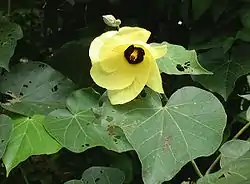waru
See also: waṟu
Dhuwal
References
- D.R. Zorc (ed.), Yolngu-Matha dictionary. School of Australian Linguistics, Darwin Institute of Technology. (1986), p. 257
Indonesian

waru (1)
Etymology
From Javanese waru (ꦮꦫꦸ), from Old Javanese waru, from Proto-Malayo-Polynesian *baʀu. Doublet of baru.
Pronunciation
- IPA(key): [ˈwa.ru]
- Hyphenation: wa‧ru
Noun
waru (plural waru-waru, first-person possessive waruku, second-person possessive warumu, third-person possessive warunya)
- sea hibiscus, cottonwood hibiscus (Talipariti tiliaceum, syn. Hibiscus tiliaceus)
- Synonym: baru
- (in extension, card games) spade: a playing card marked with the symbol ♠.
- Synonym: sekop
See also
| Suits in Indonesian · jenis kartu (see also: kartu, kartu remi) (layout · text) | |||
|---|---|---|---|
| hati | wajik, berlian | sekop, waru | keriting |
Further reading
- “waru” in Kamus Besar Bahasa Indonesia, Jakarta: Agency for Language Development and Cultivation – Ministry of Education, Culture, Research, and Technology of the Republic of Indonesia, 2016.
Javanese
Romanization
waru
- Romanization of ꦮꦫꦸ
Kikuyu
Pronunciation
- IPA(key): /wàɾúꜜ/
- As for Tonal Class, Benson (1964) classifies this term into Class 3 with a disyllabic stem, together with kĩhaato, mbembe, kiugo, and so on.
- (Kiambu)
- (Limuru) As for Tonal Class, As waaru, Yukawa (1981) classifies this term into a group including bũrũri (pl. mabũrũri), ikara, ikinya, itimũ, kanitha (pl. makanitha), kiugo, kĩhaato, maguta, mũgeka, mũkonyo, mũrata, mwana, mbembe, mbũri, nyaga, riitho, riũa, rũrĩmĩ (pl. nĩmĩ), ũhoro (pl. mohoro), and so on.[1]
See also
References
- Yukawa, Yasutoshi (1981). "A Tentative Tonal Analysis of Kikuyu Nouns: A Study of Limuru Dialect." In Journal of Asian and African Studies, No. 22, 75–123.
- “waru” in Benson, T.G. (1964). Kikuyu-English dictionary, p. 561. Oxford: Clarendon Press.
Lindu
Maori
| < 7 | 8 | 9 > |
|---|---|---|
| Cardinal : waru | ||
Etymology
From Proto-Polynesian *walu, from Proto-Oceanic *walu, from Proto-Malayo-Polynesian *walu, from Proto-Austronesian *walu.
Old English
Etymology
From Proto-Germanic *warį̄, feminine abstract noun formation on Proto-Germanic *warō, from Proto-Indo-European *wor-. Cognate with Old High German wara, Old Saxon wara, Old Dutch *wara, Gothic 𐍅𐌰𐍂𐌴𐌹 (warei).
Pronunciation
- IPA(key): /ˈwɑ.ru/
Declension
Pitjantjatjara
Polish
Pronunciation
- IPA(key): /ˈva.ru/
- Rhymes: -aru
- Syllabification: wa‧ru
This article is issued from Wiktionary. The text is licensed under Creative Commons - Attribution - Sharealike. Additional terms may apply for the media files.